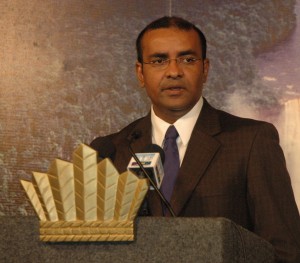 President Bharrat Jagdeo and other members of the United Nations High Level Advisory Group on Climate Change Financing (AFG) met on Tuesday in Ethiopia for a final round of talks to identify potential sources of revenue for climate change adaptation and mitigation.
President Bharrat Jagdeo and other members of the United Nations High Level Advisory Group on Climate Change Financing (AFG) met on Tuesday in Ethiopia for a final round of talks to identify potential sources of revenue for climate change adaptation and mitigation.
According to a Government Information Agency (GINA) release, following the meeting in Addis Ababa, the Advisory Finance Group is expected to complete its report by the end of October and present it to the 16th Conference of the United Nations Framework Convention on Climate Change in Cancun, Mexico, by the end of November.
The AFG met in London and New York earlier this year. The AFG is chaired by Norwegian Prime Minister Jens Stoltenberg, and has two other heads of state, Ethiopian Prime Minister Meles Zenawi, and President Jagdeo.
Other members of the Group of Experts come from Brazil, China, France, India, Japan, Mexico, Singapore, South Africa, and the United States.
Distinguished private experts include George Soros of Soros Fund Management, and Professor Nicholas Stern of the London School of Economics.
During the Copenhagen Summit, in December 2009, it was agreed that a US$10 billion “Fast Start” fund would ‘kick-start’ adaptation mechanisms in Africa and small island states. It was also agreed that US$100 billion per year would be raised by 2020.
Guyana has been actively involved in the fight against greenhouse gas emissions which contribute to global warming and, more broadly, to climate change.
Guyana’s Low Carbon Development Strategy has been praised worldwide, and several countries around the world are now studying the Guyanese approach, which is based on avoided deforestation.
Deforestation is one of the major contributors to greenhouse gas emissions.
President Jagdeo has noted that climate change is too dangerous for low-lying countries like Guyana to ignore, and too important to be left to philanthropy.
The AFG, established by UN Secretary General Ban Ki-moon, is viewed as critical to the global climate change summit held in Copenhagen last December and the follow- up event to be held in Cancun, Mexico.
At the Copenhagen conference, fervent lobbying efforts enabled the expansion of the Reduced Emissions on Deforestation and forest Degradation (REDD) initiative to include countries that have low levels of deforestation, such as Guyana.
Long before the Copenhagen conference, President Jagdeo actively lobbied for the concept of REDD to be widened to “REDD Plus”, so as to add forest conservation to the overall concept of cutting deforestation rates – a position that received much support from both developing and developed countries.
Under the original conception of REDD, countries like Guyana could not have received any money, since previous international agreements, including the Kyoto Protocol which will end in 2012, did not reward countries that conserve their forests.
Unfortunately, the new proposed mechanism was not formally codified in Copenhagen.




Comments are closed.